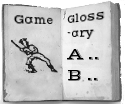Roundstakes
| Game | Roundstakes |
|---|---|
| Game Family | Baseball |
| Location | |
| Regions | US |
| Eras | Predecessor, 1800s |
| Invented | No |
| Tags | |
| Description | A memoir in Eastern Massachusetts, written about local play in about 1870, describes a game called "roundstakes" or "rounders." "The game that bore the closest resemblance to our modern baseball was "roundstakes" or "rounders." In some communities it was know (sic) as "townball." This game of roundstakes was often played on village commons, or muster fields, on holidays or other public occasions. Among the larger boys it was the popular game at school. "It was this game that was so modified as to become later the baseball of today. It was originally an old English game much played in the colonies. A soft ball was always used. It was made of yarns or other soft materials and covered with leather or a network to prevent unwinding. Instead of throwing this ball to a baseman it was thrown at the baserunner himself. If a hit was made by a thrower, the runner was out. The bases were usually posts or stakes, but sometimes stones. These had to be circled or touched by the runner. There were no fair or foul balls. The batter ran on any hit, however light, or on his third strike. There were no called balls or called strikes. The batter could strike out, fly out or be hit be a thrown ball when between bases. The game was played between teams or sides of equal numbers, usually from seven to ten. The play was generally without an umpire."
|
| Sources | Chapter 13, "The Coming of Baseball," in When Grandpa Was a Boy: Stories of My Boyhood As Told to My Children and Grandchildren," by Charles Peter Sinnott (four types pages; presumed unpublished; from the Maxwell Library Archives, Bridgewater State College, Bridgewater MA). |
| Source Image | [[Image:|left|thumb]] |
| Comment | This memoir also describes old-cat games and how youth adjusted to modern base ball when it arrived. See Protoball item 1870c.8. Edit with form to add a comment |
| Query | Edit with form to add a query |
| Has Supplemental Text |
Comments
<comments voting="Plus" />
